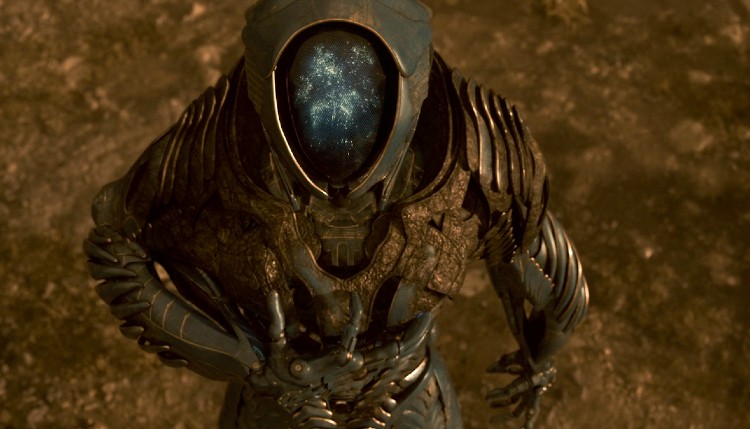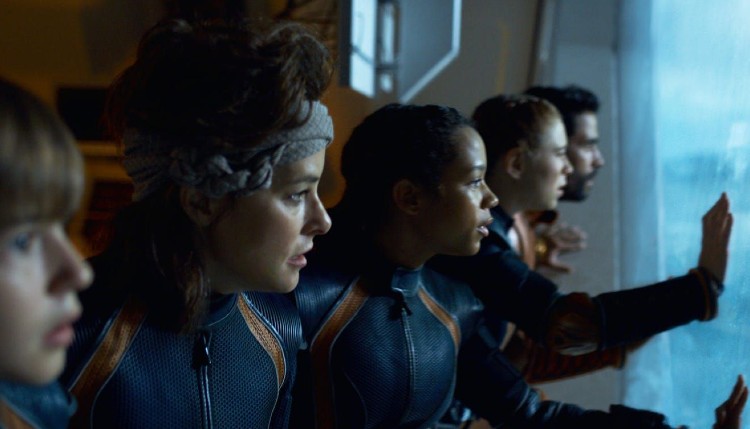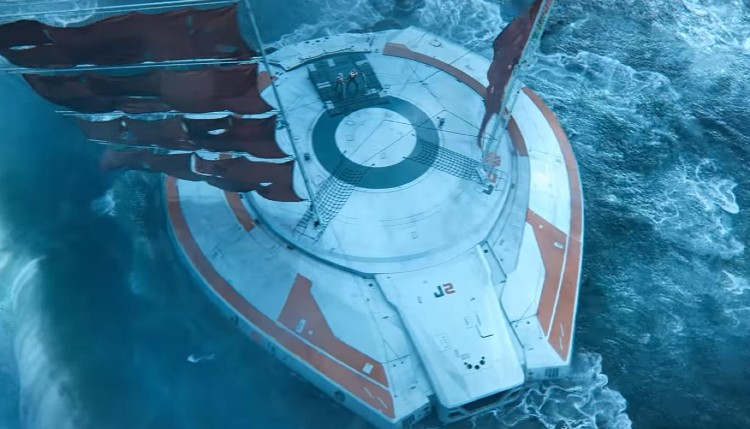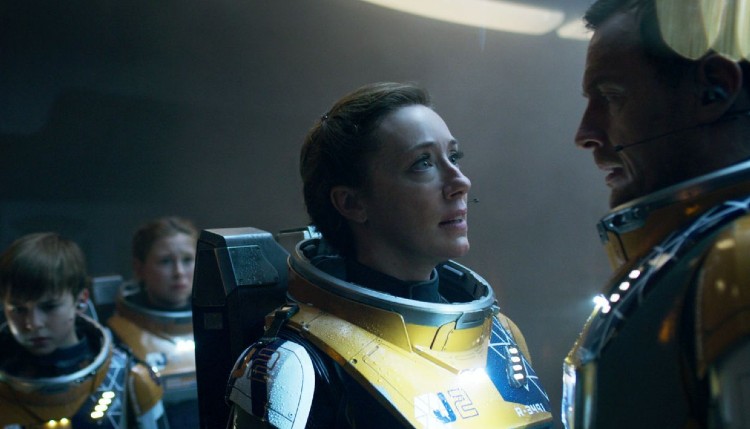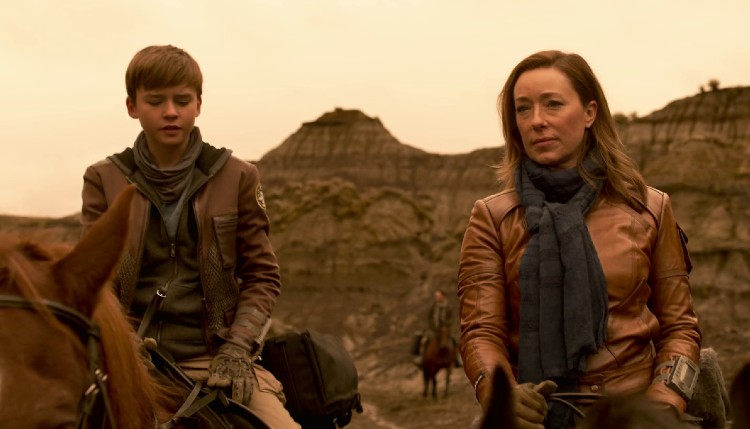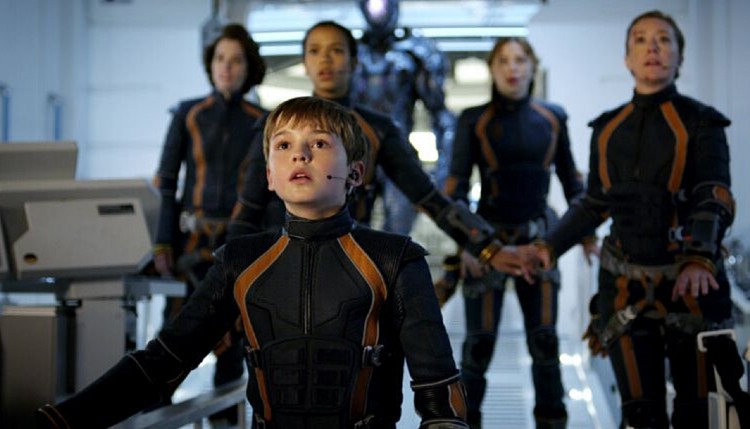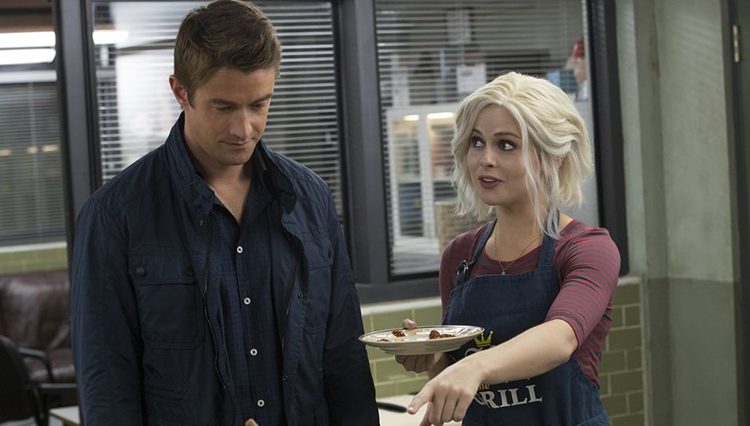Corruption is the name of the game in season two of Netflix’s underappreciated Lost in Space, starring Molly Parker, Toby Stephens, and Parker Posey. Where there was hope, determination, and enterprise in the first ten-episode series, we come to realize that strings are being pulled. I took issue (in the first series) with the eugenics-laden mentality of selecting our “best and brightest” for a journey through space to save the human race, because the idea makes assumptions about what is best.
Our world, as it stands right now, is not made up of our “best.” It’s a melting pot of infidelity, fraternity, madness, fear, courage, and cowardice as well as prejudice and equity, and you don’t attract these characteristics by running them through a sieve and rejecting anything you think is destructive. As we know, creation can come from destruction. Some would argue that’s how we (ourselves and our universe) came into existence. We know that Maureen (Parker) lied and falsified test results to get Will (Maxwell Jenkins) approved for the mission.
I wonder what would happen should Will not be approved. Would he be required to live out the remainder of his long life on a dying planet while the rest of his family traversed the cosmos? Would we do that to an 11-year-old boy who didn’t quite make the grade because he lost control of his faculties in simulated, pressurized environments? It doesn’t matter to me, but it does become an albatross around Maureen’s neck; all for love of her son. Something is terribly wrong with this idea.
Operation: Save Humanity is managed as if by a soulless corporation that makes terrible decisions. Because we’re watching the show, we’re, in effect, living with the Robinsons, so we’re subject to their crazy moods, their flashes of genius, and their mistakes. They do make mistakes. The biggest mistake they made in the previous season was believing and trusting “Dr. Smith” (Posey). This is a central issue with our “best and brightest.” They’re too busy being brilliant to understand how the deviant behaves. They don’t get it.
Maybe Don West (Ignacio Serricchio) gets it a little because he’s a bit of a con artist himself, but he has the talent to back it up. He isn’t anybody who would be selected as the “best and brightest,” as he kind of bluffed his way into escaping from the Resolute as it was attacked by our robot enemy friends, but he is resourceful and good with tools. Eugenics aside, it’s a bad idea to not have qualified human beings; qualified in all skills. Dr. Smith is a master manipulator and, as this season underscores, a skilled hacker.
She completely robs the real Dr. Smith (Bill Mumy) of his identity, removes all traces of her crimes from the computers, and rewrites her identity as that of Dr. Smith, after rendering Captain Radic comatose (by means of toxic kelp) when he finally catches up with her. She does everything she can to discredit the people around her who can see her for what she really is, and shockingly, nobody is the wiser. We jump forward seven months and the Robinsons plus Don, the Robot, and an imprisoned Dr. Smith have planted a flag on a hostile planet.
They’ve put together a home with a garden growing vegetables. The ship is depressingly low on juice but Maureen figures the regularly-occurring lightning storms could provide a jump for the vessel to get back into space and find the Resolute space station. They design sails and use their Jupiter as a boat, and Smith helps them navigate rough seas. Once they reach the Resolute, they discover the station has been abandoned after Will’s robot and his friend, SAR (“Second Alien Robot”) attempt to commandeer the station.
SAR was damaged to the point of becoming hobbled, and Will’s robot (as well as the Resolute’s remaining population) escaped to a nearby planet. The Robinsons manage to capture the injured SAR and make contact with the survivors. All of this, of course, will mean nothing to the leaders and administrators of Operation: Save Humanity; noting that they have commanded a great deal of respect from their fellow colonists. It seems management has borrowed a couple of pointers from Smith.
They attempt to discredit the Robinsons when their plan to abandon more than half the colony to the planet threatens to be exposed. Again, these are our “best and brightest?” The long and short of it is that the water they’ve been collecting is tainted with a parasite that devours metal, thus they won’t have enough water to accommodate the full complement of colonists. They try to blackmail Maureen because of her falsifying of Will’s test results, and shockingly, she goes along with it for a couple of minutes. It’s amazing to me how naive geniuses can be.
We get a couple of duplicitous boobs in Hastings (Douglas Hodge) and Adler (JJ Feild), intelligence and technology officers who obfuscate the truth of the contaminated water and basically hijack the Resolute using the technology (now revealed to be stolen) from the Robots. No wonder they’re so pissed! I would be too. Add to this the Eugenics angle. Would you trust these goons to make decisions on this scale when their very process is skewed by amorality and treachery? That’s not even to speak of the children.
In a mission such as this, children would be the most precious commodity, and therefore not subject to testing. Indeed, in the final episode of this series, Judy Robinson captains a ship consisting only of children, as the Resolute is under attack from robots and being pointed toward a planet’s atmosphere where it will disintegrate. There are only 97 children on the ship. This smells of bizarre algorithms and social engineering. This second season of the show is mostly about Judy Robinson and “Dr. Smith.”
“Dr. Smith,” we learn, is really June Harris, and she has swindled a bunch of people out of their money by pretending to be a financial advisor or some near-future equivalent. Her flighty drug-addicted mother, Sheila, in a bit of stunt casting, is played by Angela Cartwright, the original Penny Robinson from the 1965 Lost in Space. Smith cons her way into an advisory position with the command crew on the Resolute. Judy Robinson (Taylor Russell) has turned into a problematic character, mainly because she is written to be perfect in everything she does.
She’s heroic, stunning, and brave, therefore she comes off as a bit of a drag when compared to the still-awkward wallflower, Penny. She’s given a story arc that somehow connects to her biological father, Grant Kelly, who was presumed dead when his ship, the Fortuna, was … lost in space. As the season wraps up, Judy, piloting the ship of children, discovers the wreckage of the Fortuna, caught in a belt of debris at the end of a rift that should have taken them to Alpha Centauri.
Overall, this was a decent sophomore season for the now-cancelled Netflix show. I can’t fathom why Netflix would abandon this show. It is so much better than Stranger Things, a series that started to wear out its welcome after the first brilliant season. The only reason I can come up with is the budget. You have a couple of names in the cast, and the visual effects are some of the best I’ve ever seen in a television show. This is the standard treatment Netflix gives its more expensive shows.
I’ve noted that there is an enormous outlay of money at the beginning of a show’s run, as with a show like Altered Carbon, for example. Altered Carbon’s first season was incredible. In the second season, it was obvious the show’s budget had been cut, and then it was eventually cancelled. I suspect Netflix drums up enthusiasm for a show, collects new subscriptions, and then finances their shows based on those subscriptions. It’s sort of a bait-and-switch business model, and this is probably why streaming services (that don’t depend on advertising revenue) will ultimately fail.
Consider that once you’ve gotten subscriptions from every television consumer all over the world, you’ll eventually start losing money no matter how much you raise your prices. Netflix has already (rather dramatically) raised its rates over the last four years. My bill went up five bucks from $11.99 and the only changes I’ve noted are that some of my favorite shows have disappeared from their catalog. The rise of streaming entertainment has only underscored the need for physical media. It’s only a matter of time.


